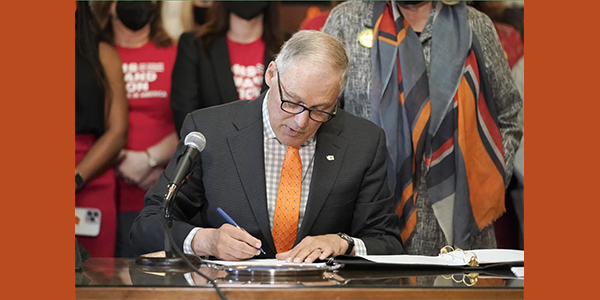||| FROM THE OFFICE OF GOVERNOR JAY INSLEE |||
Washington stands with Ukraine on anniversary of Russian invasion

Gov. Jay Inslee shakes hands with Oleg Pynda, executive director of Washington’s Ukranian Community Center. The center is a key link for newcomers, including the 16,000 Ukrainian immigrants new to Washington state.
One year has passed since Russia began its campaign to invade Ukraine, and the conflict remains ongoing. Refugees and Ukranian-Americans still anguish for their nation, and Ukranians fighting for liberty still rely on support from world citizens.
Over the last decade, more than 30,000 refugees from 70 countries have settled in Washington through the U.S. Refugee Admissions program. Since Russia’s illegal seizure of the Crimean Peninsula in 2014, Washington has become home to more Ukrainian refugees than any other state, according to The Seattle Times.
In the last year alone, Washington has taken in 16,000 more Ukrainian refugees.
Read the full story on Gov. Jay Inslee’s Medium here.
Inslee, Ferguson sustain commitment to protect reproductive freedom
A woman holds a sign proclaiming “Keep Your Laws OFF Our Bodies” at a June press conference organized by Gov. Jay Inslee to announce a decisive response to protect reproductive freedom after the United States Supreme Court’s decision in Dobbs v. Jackson Women’s Health Organization.
The governors of 20 states jointly founded the Reproductive Freedom Alliance this week to protect the right of choice and access to reproductive health care. The last year has seen an unprecedented assault on abortion access, reproductive health care, and even contraception. The alliance will coordinate to strengthen protections and improve care access within their states, and advocate for national progress.
“This is an issue of freedom,” said Gov. Jay Inslee. “Patients must have the freedom to make personal reproductive care decisions for themselves, without interference by activist politicians. Washington is taking strong action to protect these freedoms for every patient and provider in our state, and we are all in on the fight to protect a person’s right to an abortion across the country.”
The launch of the Alliance comes as multiple states are challenging the Food & Drug Administration’s burdensome restrictions on mifepristone. The pill was first approved by the FDA in 2000 for use in medication abortions, but its use remains restricted despite decades of evidence suggesting its safety. Attorney General Bob Ferguson announced that he will lead a multistate federal lawsuit to dismantle those regulations. At the same time, anti-abortion groups in Texas are suing the FDA in a bid to end the sale of the pill nationwide.
Also this week, Ferguson announced a new resource offering pro bono legal assistance to facilitate abortion access. Health care seekers and providers may request free legal guidance and resources from a national network of attorneys, including several firms within Washington state.
“Radical laws in other states are creating chaos for providers, out-of-state patients and individuals assisting their friends and family to access health care,” said Ferguson. “This resource will help them navigate these important issues and protect their freedoms.”
Graduation rates on the rise statewide

Gov. Jay Inslee chats with students in a health care careers introduction course at Mount Tahoma High School in Tacoma during a visit in October.
This week, the governor’s Results Washington office hosted a public performance review to discuss recent efforts to improve graduation rates and hear stories from students who overcame barriers to earning their diploma.
The graduation rate of Washington students has climbed steadily by 6.3% over the last decade. In the most recent school year, 82.3% of students received a diploma after four years.
Graduation is a tall order for students experiencing housing instability or living in foster care. But in just the last year, the graduation rate for students in foster care has improved by 5%. Students experiencing homelessness improved by 1.6%, and students with disabilities improved by 1.4%
“This is gratifying to me because these kids are kids with real challenges coming out of foster care and homelessness,” said Inslee. “High school is tough enough.”
Progress for any one group is achieved by focused efforts. In the case of students in foster care, investments to deliver those students individual attention have paid dividends.
The governor’s budget proposals have consistently supported programs like Treehouse’s Graduation Success program, which pairs youth in foster care with specialists who motivate them through school and help them access tutoring, college prep, and other resources.
The governor’s proposed budget for the 2023-25 biennium would commit an additional $3 billion to K-12 education to help pay and recruit teachers, and to help challenged student groups realize their full potential. Enhancements in special education would help students with disabilities thrive. Investments in food security would ensure that every student eats. Behavioral health programming would offer students counseling and support when they need it. Focused, deliberate efforts to help students succeed are a priority for the governor and legislators this session.
Commerce relief boosts thousands of small businesses
A recent round of state grants has invested $75 million to help more than 3,700 small Washington businesses and nonprofits still recovering from the pandemic. Some sectors have been slow to rebound, namely arts and cultural businesses, nonprofits, and businesses dependent on convention or conference traffic. The recent grants were targeted to boost those businesses specifically.
The grants were awarded by the state Department of Commerce in partnership with the Washington State Arts Commission. Funds went to businesses in each of Washington’s 39 counties, and more than 70% supported businesses in historically disadvantaged communities. 1,500 of the businesses to receive an award are in the arts and culture sector.
“Arts, heritage, and science organizations are the heart of our communities and our economy,” said Karen Hanan, Executive Director of ArtsWA. “We have more work to do, but the success of Working Washington Grants: Round 5 is a cause for celebration.”
This is the fifth round of Working Washington grants awarded by Commerce. Overall, Commerce has now provided more than $436 million in Working Washington relief grants to more than 29,000 businesses and nonprofits across the state. A new $100 million grant round will open in March to support the hospitality sector.
Additionally, Commerce launched a Flex Fund in 2021. The flexible small business loan program provides capital loans to small businesses and nonprofits of up to $150,000 with low interest rates and a 60-month repayment timeline. The deadline to apply is Feb. 28.
Sign up to receive email notices of open grants, loans and RFPs from Commerce.
Legislative session – week 7 in review
Friday marks the 47th day of the 105-day session, and also the day for fiscal committee cutoff. The Senate Ways & Mean Committee agenda for Friday includes 56 bills, and the House Appropriations Committee has 40 bills. Non-budget bills that haven’t cleared a fiscal committees by the end of Friday are left on the cutting room floor. (Exceptions can be made if a legislator convinces legislative leaders their bill is “necessary to implement the budget” and not subject to cutoff. These are referred to as “NTIB bills” and the arguments for this designation can become quite creative.)
Among the bills that cleared committee in the final hours is HB 1110, the bipartisan bill to legalize more types of housing across the state to include buildings such as duplexes or fourplexes. Proposals like this and the governor’s bill to increase housing density near transit are among the many efforts this session to address the state’s housing crisis. Rep. Jamila Taylor’s proposal to address historic housing discrimination also cleared committee this week.
The Senate continued to advanced Sen. June Robinson’s “Blake fix” bill on Thursday. Amendments and changes are still likely as the bill moves to the floor and then over to the House, but the current version establishes a gross misdemeanor charge for drug possession with options for defendants to complete drug treatment instead of jail time.
Also moving forward is a package of bills that would expand access to dual-credit programs. These are programs that allow high school students to take classes and earn credits for both high school and college. Examples include Running Start and College in the High School. They provide an affordable pathway to higher education for thousands of students.
Much of the Legislature’s focus will shift next week to floor action. Legislators will be working late nights to pass bills out of their “house of origin” to the other chamber by 5:00 p.m. on March 8. TVW is a reliable source for all the live action.
News you might have missed:
WAVE scholarship may cover two years of tuition for high-performing students
The Washington Award for Vocational Excellence (WAVE) scholarship rewards high-performing high school and college applicants with up to $23,400 over two years towards undergraduate expenses at public and private colleges in Washington state, and some licensed private career schools. The award is competitive, and applications must be submitted by Mar. 17.
Progress at Camp Hope means more people inside and job training underway
More than 70 former occupants of Camp Hope in Spokane now reside in the new Catalyst supportive housing program. A new four-week pre-employment training program kicks off next week to ready participants for work. State Department of Transportation crews had already removed more than 48,000 pounds of debris from the site, and the department has contracted to remove any additional debris.
Spokane six-year-old sells hot cocoa to help the homeless
Blaine Binger, a six-year-old from Spokane, recently moved to Washington state from Texas and is experiencing his first Washington winter. When he saw people living unhoused in the cold, he did something about it. He took a big cardboard box and fashioned a stand from which to sell hot cocoa, and he made more than $900. He plans to donate every dime to local charities to help the homeless. Gov. Jay Inslee called Blaine on Tuesday to name him “Washingtonian of the Day” for his effort.









